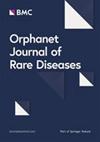通过全外显子组测序对妊娠失败和胎儿结构异常进行遗传分析
IF 3.4
2区 医学
Q2 GENETICS & HEREDITY
引用次数: 0
摘要
全外显子组测序(WES)已被推荐用于研究胎儿结构异常的遗传原因。在这项回顾性研究中,我们旨在评估全外显子组测序在因结构异常而妊娠失败或终止妊娠的家庭中的诊断率。由于非整倍体、三倍体和拷贝数变异(CNVs)可以通过基于外显子的 CNV 分析检测出来,因此本研究只进行了 WES 分析。本研究分析了 375 例通过 WES 评估的病例的结果。总检出率为 32.3%(121/375),包括非整倍体和三倍体(7.5%,28/375)、CNVs(5.1%,19/375)和单核苷酸变异(SNVs)/插入或缺失(Indels)(19.7%,74/375)。其中,可能致病(LP)或致病(P)CNV 的诊断率为 4.8%(18/375),LP 或 P SNV/Indels 的诊断率为 15.2%(57/375)。另有4.8%(18/375)的病例的CNV或SNV/Indels被归类为具有潜在临床意义的不确定意义变异(VUS)。我们的研究结果扩大了与胎儿畸形有关的基因变异的已知突变谱,增加了我们对产前表型的了解,并能对未来妊娠的复发风险提供更准确的咨询。本文章由计算机程序翻译,如有差异,请以英文原文为准。
Genetic analysis of pregnancy loss and fetal structural anomalies by whole exome sequencing
Whole exome sequencing (WES) has been recommended to investigate the genetic cause of fetal structural anomalies. In this retrospective study, we aimed to evaluate the diagnostic yield of WES in our cohort of families with pregnancy loss or termination of pregnancy due to structural anomalies. As aneuploidy, triploidy and copy number variations (CNVs) could be detected by exome-based CNV analysis, only WES is performed in this study. And the results of 375 cases assessed by WES were analyzed. The overall detection rate was 32.3% (121/375), including aneuploidy and triploidy (7.5%, 28/375), CNVs (5.1%, 19/375) and single-nucleotide variants (SNVs) /insertions or deletions (Indels) (19.7%, 74/375). Among these, the diagnostic yield for likely pathogenic (LP) or pathogenic (P) CNVs is 4.8% (18/375), and the diagnostic yield for LP or P SNVs/Indels is 15.2% (57/375). And an additional 4.8% (18/375) of cases had CNVs or SNVs/Indels classified as variants of uncertain significance (VUS) with potential clinical significance. Our findings expand the known mutation spectrum of genetic variants related to fetal abnormalities, increase our understanding of prenatal phenotypes, and enable more accurate counseling of recurrence risk for future pregnancies.
求助全文
通过发布文献求助,成功后即可免费获取论文全文。
去求助
来源期刊

Orphanet Journal of Rare Diseases
医学-医学:研究与实验
CiteScore
6.30
自引率
8.10%
发文量
418
审稿时长
4-8 weeks
期刊介绍:
Orphanet Journal of Rare Diseases is an open access, peer-reviewed journal that encompasses all aspects of rare diseases and orphan drugs. The journal publishes high-quality reviews on specific rare diseases. In addition, the journal may consider articles on clinical trial outcome reports, either positive or negative, and articles on public health issues in the field of rare diseases and orphan drugs. The journal does not accept case reports.
 求助内容:
求助内容: 应助结果提醒方式:
应助结果提醒方式:


